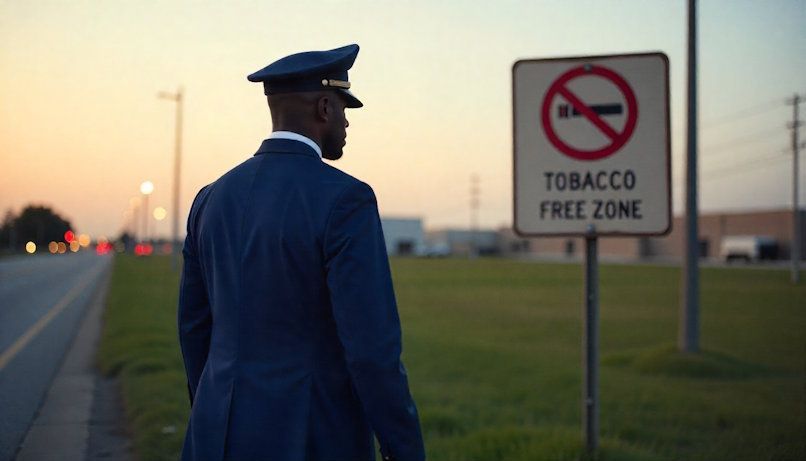Can Wright-Patterson AFB Members Use Hypnosis to Quit Smoking?

TLDR: Yes. Hypnosis is not formally offered on base, but active duty, veterans, and civilians connected to Wright-Patt can all use it to quit smoking. With the right paperwork, Tricare, VA programs, or HSA/FSA funds may even cover it. Hypnosis fills the missing link by targeting subconscious triggers that patches, gum, or willpower alone don’t reach.
What Is Clinical Hypnosis and Why Should WPAFB Members Care?
Clinical hypnosis, also called hypnotherapy, is a therapeutic technique that places you in a deeply focused state where suggestions can reshape automatic behaviors. The Cleveland Clinic and Mayo Clinic both cite hypnosis as a safe and effective tool for smoking cessation, pain relief, and stress reduction.
Why does that matter for Wright-Patt members? Because smoking isn’t just a “bad habit.” For many military personnel, it’s tied to stress relief, social bonding, or structured breaks during duty. Hypnosis works below the surface, changing the mental scripts that make lighting up feel automatic.
What Tobacco Cessation Programs Does WPAFB Already Offer?
Currently, Wright-Patt offers a Tobacco Cessation Program through its health and wellness services:
- Nicotine replacement therapies (NRT): patches, gum, lozenges distributed by base pharmacies
- Counseling: one-on-one or group sessions
- Quitline support: 1-800-QUIT-NOW and military-specific hotlines
- Policy enforcement: designated tobacco-free zones
These programs cover the basics, but they stop short of addressing why cravings return even after nicotine is removed. That’s the psychological gap hypnosis fills.
Can Active-Duty Service Members Use Hypnosis to Quit Smoking?
Yes, but it requires initiative. Tricare may cover hypnosis when deemed medically necessary. To pursue this, active-duty members usually need:
- A provider referral
- Documentation of nicotine dependence
- Proper receipts or pre-authorization
Even without reimbursement, active-duty members frequently pay out-of-pocket or use HSA cards for sessions in Dayton. For many, the ability to quit without months of struggle is worth the small investment.
Can Veterans at the Dayton VA Use Hypnosis?
The Dayton VA already provides robust cessation programs — but hypnosis isn’t formally listed. Veterans can add it privately to boost success. Because hypnosis is drug-free and low-risk, it complements VA treatments such as nicotine replacement or counseling.
Veterans with HSA or FSA accounts can use them for hypnosis with a Letter of Medical Necessity (LMN). This often comes from a VA provider willing to document nicotine dependence and recommend adjunct therapy.
Can Civilian Employees and Contractors at WPAFB Use Hypnosis?
Yes. Civilian staff and contractors aren’t tied to Tricare. They can:
- Use HSA/FSA funds with a physician LMN
- Leverage employer wellness stipends (common among defense contractors)
- Pay directly and keep receipts for tax documentation
For contractors balancing tight deadlines, security checks, and tobacco-free zones, hypnosis offers a discreet, professional way to quit for good.
Why Is Hypnosis Especially Effective for Military Lifestyles?
Military routines reinforce habits. Smoking often starts as a way to decompress on deployment, bond with peers, or cope with unpredictable schedules. Over time, it becomes hard-wired.
Hypnosis targets this by:
- Reprogramming “smoke break = relief” into “deep breath = relief”
- Installing calming anchors that work under pressure
- Helping members see themselves as non-smokers at a subconscious identity level
This makes hypnosis especially effective for the unique culture of Wright-Patt.
What Local Smoking Triggers Around WPAFB Can Hypnosis Help With?
- Traffic stress: Long commutes on I-675 or US-35
- After-shift drinks: Bars in Beavercreek or Fairborn where smoking is social
- Veteran hangouts in Huber Heights: Familiar cues that trigger relapses
- Cold mornings on the flight line: Cigarettes used for “warmth” or energy
Hypnosis gives you new automatic responses so these triggers lose their grip.
Case Study #1: Active-Duty Airman Finds Relief in 2 Sessions
“James,” a 28-year-old airman, smoked during nearly every shift break. His trigger wasn’t nicotine withdrawal but stress. After just two hypnosis sessions, James learned to anchor deep breathing to the same relief his brain expected from a cigarette. Six months later, he hasn’t smoked once.
Case Study #2: Veteran Breaks a 30-Year Habit
“Mike,” a 52-year-old veteran from Huber Heights, tried the VA program twice and relapsed. With hypnosis:
- Session 1: Built subconscious aversion to the smell of smoke
- Session 2: Installed coping scripts for traffic and social settings
- Session 3: Reinforced his new self-image as a non-smoker
Mike has been smoke-free for 14 months. He says: “The VA gave me tools. Hypnosis rewired my brain.”
Case Study #3: Civilian Contractor Beats the “Commute Cigarette”
“Laura,” a 41-year-old contractor, smoked only in her car on the drive to Wright-Patt. Everleigh Hypnosis helped her replace that ritual with an audio routine combining relaxation and visualization. Two weeks later, she reported no cravings during her 40-minute commute.
How Does Hypnosis Compare to Other Quit Methods in Dayton?
Nicotine Patches & Gum (NRT)
- How it works: Delivers steady nicotine dose to ease withdrawal.
- Pros: Reduces cravings and is widely available.
- Cons: Doesn’t address mental triggers — many relapse when stress hits.
- Local access: Sold at WPAFB pharmacies and Dayton stores.
Prescription Medications (Chantix, Zyban)
- How it works: Alters brain chemistry to reduce cravings.
- Pros: Clinically proven to improve quit rates.
- Cons: Can cause side effects; requires a prescription.
- Local access: Available through base providers and the Dayton VA.
Counseling & Quitlines
- How it works: Provides coaching, accountability, and education.
- Pros: Free and easy to access.
- Cons: Relapse risk remains high if subconscious triggers aren’t addressed.
- Local access: Offered via WPAFB programs and VA resources.
Hypnosis (Clinical Hypnotherapy)
- How it works: Rewires subconscious cravings and stress loops.
- Pros: Rapid results, drug-free, lowers stress, builds long-term resilience.
- Cons: Results vary by individual.
- Local access: Offered off-base at professional hypnotherapy practices in Dayton.
What Does the Research Say About Hypnosis for Smoking?
- A 2019 review in Frontiers in Psychology found hypnosis significantly improved quit rates compared to standard counseling.
- Studies at Stanford and Mount Sinai confirm hypnosis reduces cravings and strengthens motivation to quit.
- Some trials show hypnosis can double quit rates compared to going cold turkey.
While no method is perfect, hypnosis stands out because it tackles the psychological roots of addiction, not just the physical withdrawal.
👉 Ready to quit smoking for good? Call Everleigh Hypnosis today and ask about our Military Quit Plan — designed for Dayton’s active-duty, veterans, and contractors.
How Can WPAFB Members Combine Hypnosis With Base Programs Step by Step?
- Enroll in the WPAFB Tobacco Cessation Program for NRT and counseling.
- Request an LMN from your provider if you want to use Tricare or HSA/FSA.
- Book hypnosis sessions off-base in Dayton.
- Stack approaches: use hypnosis alongside patches or meds if prescribed.
- Track progress and report back to your doctor for accountability.
This hybrid method merges structured base support with subconscious reprogramming for maximum results.
FAQs About Hypnosis for Wright-Patt Members
- Is hypnosis officially offered at WPAFB?
No. It’s not banned — it’s simply not provided in-house. Members can access it off-base. - Will Tricare cover hypnosis?
Sometimes, but it depends on the referral and plan specifics. Even if not, you can still use HSA/FSA funds with a medical letter. - How many sessions will I need?
Many see results in 1–3 sessions. Reinforcement can help long-term smokers or high-stress cases. - Can hypnosis be combined with nicotine patches or Chantix?
Yes. Hypnosis is drug-free and enhances results when used with NRT or medications. - Is hypnosis safe for military members?
Yes. Hypnosis is safe, non-invasive, and backed by multiple health organizations. You remain alert and in control.
How Can WPAFB Members Get Started With Hypnosis in Dayton?
👉 Active duty: Ask your Tricare provider for an LMN and schedule a Dayton session.
👉 Veterans: Combine VA cessation tools with hypnosis for a stronger plan.
👉 Civilians/contractors: Call Everleigh Hypnosis and request our free HSA/FSA guide.
👉 Want to quit using tax-free dollars? Read more about HSA/FSA Hypnosis here...and learn how to cover sessions with pre-tax funds.
Share
Welcome to our Hypnotherapy Blog, your go-to resource for the latest news, updates, and insights from the world of hypnotherapy for Dayton, Ohio and beyond! Whether you’re new to hypnosis or a seasoned practitioner, we aim to share valuable information that highlights the power of this incredible tool for transformation.
Here, we explore a wide range of topics related to hypnotherapy, including success stories from clients who have used hypnosis to overcome challenges like smoking cessation, anxiety, and stress. We also provide tips and educational articles that debunk myths and explain how hypnotherapy can help you tap into your inner potential.
Our passion for helping people shines through in every post. We are dedicated to using our skills in hypnosis to empower individuals to make positive changes in their lives. With over 27 years of experience, we’ve witnessed firsthand how powerful the mind can be when guided by the right techniques.
Thank you for visiting our blog. We hope you find inspiration and valuable insights as you explore the transformative power of hypnotherapy! Feel free to share this information with family, friends, and others you feel might find this information interesting, entertaining, or helpful in some way!











